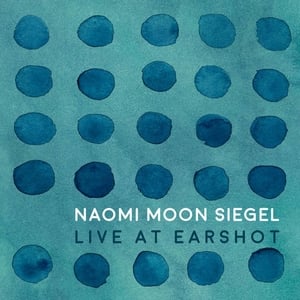
The people who complain that younger jazz musicians all sound the same aren’t getting out to the right places. Even at major venues and jazz festivals, the “clone” critique misses the mark in my experience, as today’s scene is characterized by a radical diffusion of approaches more than a dominant style. And when you start checking out the acts at the art galleries and store fronts, bookstores and bars where the music really thrives, it’s not unusual to find insistently idiosyncratic players who sound nothing like their peers and contemporaries, let alone their mentors and role models.
Case in point is trombonist/composer Naomi Moon Siegel, who played Oakland’s Octopus Literary Salon last Thursday with an unusual quartet as part of a West Coast tour celebrating the release of her gorgeous new album Live at Earshot (Slow & Steady Records). One of about half-a-dozen Uptown music spots that present jazz on a regular basis, Octopus is a bookstore and café that feels crowded with 40 people. The close confines mean that acoustic jazz combos usually play without amplification, and it was a distinct pleasure listening to Siegel’s warm, singing tone sans sound system.

Siegel lived in Oakland from 2006–2008 but came of age as a composer and bandleader on Seattle’s thriving improv scene. Living in Missoula, Montana, for the past two years, she’s honed an expansive repertoire of original folk-jazz themes that often scan as if written for lyrics, like the long, curvaceous melody of her opening tune, “Electric Flower.”
Joined by impressive young pianist Christina Galisatus, who graduates from Stanford next month, guitarist Ryan Pate, and drummer Michael Mitchell, Siegel delivered her captivating music with poise and authority. The unorthodox bass-less instrumentation added to the spacious feeling of her compositions, which felt both through-composed and open-ended. Sketching with watercolors, Siegel can capture the essence of a landscape, conflict, or state of mind with a minimum of detail.
Mitchell’s brush and mallet work gave shape and flow to Siegel’s tunes, while Pate’s bristling guitar lines provided grit and twang behind Siegel’s burnished trombone croon. The three-part “Broken Glass Sanctuary Suite,” a recent composition, explored her widest emotional range, with wrenching low-end blatts and upper range bleats that evoked loss and thwarted desires.
The set was almost finished before she played a run of eighth notes and “Jaam Rek” arrived at an apt moment, offering a bouncing, celebratory theme that also summoned a thick, romping block-chord solo from Galisatus. Tenor saxophonist Eli Maliwan, half of the duo Rice Kings that followed Siegel on the double bill, joined for her closing tune, “Fortifying Love,” an ethereal theme that floated over a sing-song eighth-note piano line. Like several earlier pieces, the tune ended abruptly, almost midthought.
I couldn’t stay for all of the Rice Kings’ set, but judging from the first few tunes, this instrumental electro-jazz duo is inordinately entertaining. Featuring Erika Oba on keyboards, flute, and looping and Maliwan on tenor sax and EWI (electronic wind instrument), Rice Kings navigates several different kinds of spaces. “The Bear of Bad News” was a peppy piece with a percolating drum track and minimalist keyboard riffs that propelled Maliwan’s full-spectrum EWI workout.
Switching to flute, Oba joined Maliwan on EWI for a wind duet on “Hatch Pepper Moon,” a striking melody with an opening phrase reminiscent of the standard “Tenderly.” Looping her flute in real time to create a rhythm track, Oba added layers to the intertwined lines, then cut the tracks suddenly for a dramatic shift. Clever, playful, and often pointedly political, Rice Kings’ music is a royal blast.




